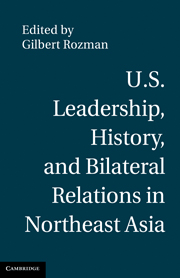Book contents
- Frontmatter
- Contents
- List of Contributors
- Acknowledgments
- U.S. Leadership, History, and Bilateral Relations in Northeast Asia
- Introduction
- PART I HISTORICAL MEMORIES AND BILATERAL TIES WITH ALLIES
- PART II HISTORICAL MEMORIES, JAPANESE–SOUTH KOREAN RELATIONS, AND U.S. VALUES
- PART III HISTORICAL MEMORIES, SINO–SOUTH KOREAN RELATIONS, AND U.S. VALUES
- Index
Introduction
Published online by Cambridge University Press: 01 March 2011
- Frontmatter
- Contents
- List of Contributors
- Acknowledgments
- U.S. Leadership, History, and Bilateral Relations in Northeast Asia
- Introduction
- PART I HISTORICAL MEMORIES AND BILATERAL TIES WITH ALLIES
- PART II HISTORICAL MEMORIES, JAPANESE–SOUTH KOREAN RELATIONS, AND U.S. VALUES
- PART III HISTORICAL MEMORIES, SINO–SOUTH KOREAN RELATIONS, AND U.S. VALUES
- Index
Summary
In 1950, history seemed all but forgotten as the specter of communism hung ominously over Northeast Asia. The Chinese Communist Party had just fought its way to power in a revolution aimed at sweeping aside history, especially Confucianism, which was seen as leaving China backward and ill prepared to rise up and modernize. The Korean War had turned Koreans away from memories of the past that united them to a fateful choice about their future as part either of the wave of communism or of the U.S.-led “free world” bloc. In Japan, preparations were under way for the San Francisco Peace Treaty, which focused on putting aside the legacy of Japan's colonialism and wars in order to rebuild as part of the U.S.-led bloc. Large numbers of Chinese, Japanese, and South Koreans were inclined to condemn their past for the sorrows and weakness it had brought; few defended it. With their eyes on modernity, which leaves the past behind, Americans were eager to embrace a democratic Japan and South Korea while condemning communist states that were seen as rejecting both their own traditions and the promise of the free market and free world.
In 2010, the specter of history is hanging over Northeast Asia, but a struggle lies ahead. Confusion reigns as to what is the true threat from historical legacies and memory. Over the previous decade, concern centered on Japanese revisionism, defending the conduct of Japan in 1895–1945 in a manner that offends its neighbors.
- Type
- Chapter
- Information
- Publisher: Cambridge University PressPrint publication year: 2010



